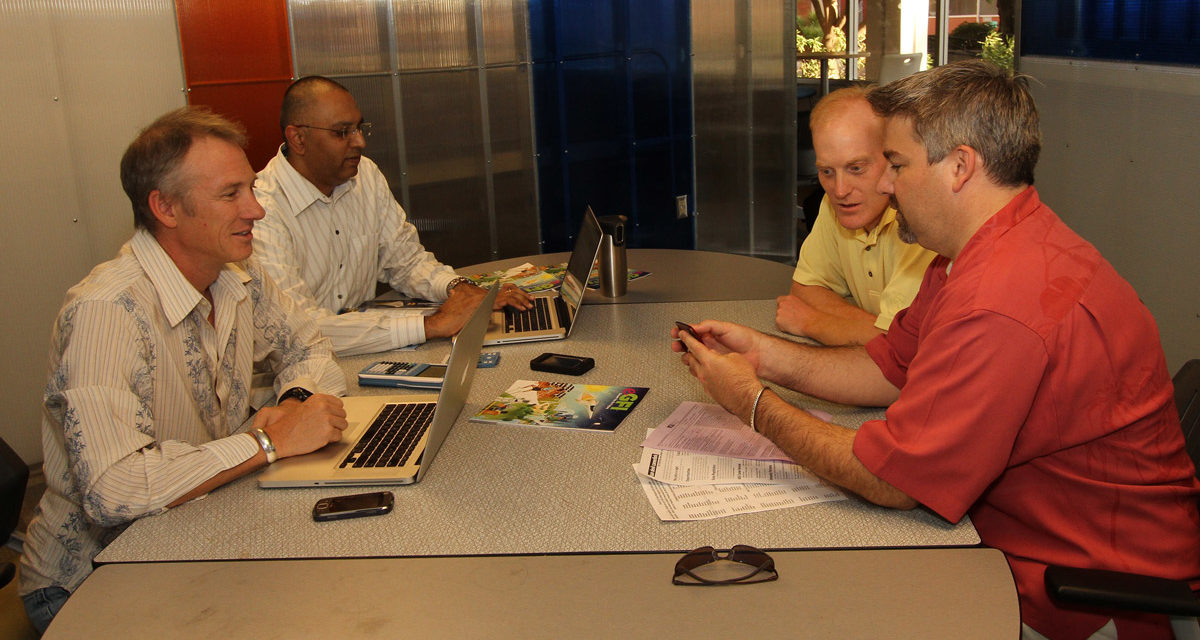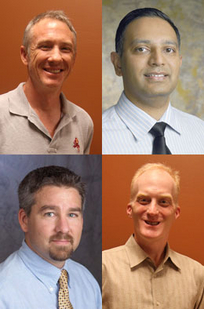
Education innovators join engineering schools

Posted: October 27, 2010
Expertise of new faculty members will boost efforts to improve quality of instruction and K-12 outreach
Four of Arizona State University’s leading education innovators have been brought into the Ira A. Fulton Schools of Engineering to help deepen the schools’ commitment to cutting-edge engineering education.
“We are building a community of faculty who are intensely engaged in advancing the ways we educate engineering students,” says James Collefello, associate dean of Academic and Student Affairs. “These four will strengthen that core group and bolster the educational research aspect of our mission.”
Professor of mathematics education James Middleton and assistant professor of engineering education Tirupalavanam Ganesh have joined the School for Engineering of Matter, Transport and Energy.
Robert Atkinson and Brian Nelson, associate professors of educational technology, have joined the School of Computing, Informatics, and Decision System Engineering.
They will provide significant additional expertise in learning methods, cognitive theory and best teaching practices, Collofello says, as well as contribute to curriculum development and instruction planning.
“They will also be involved in helping us select the appropriate instruments to measure our progress and assess our performance in moving engineering education in new and effective directions,” he says.
In addition, the schools’ K-12 science, technology, engineering and math (STEM) education outreach and student recruiting are also expected to benefit from the work of these faculty members, Collofello says.
“They bring new expertise, ideas and energy to our engineering schools,” says Executive Dean Paul Johnson. “The timing is perfect. There’s a lot of excitement about our efforts to expand educational outreach, redesign the engineering student experience and pursue more major projects for our research centers. These additional faculty will be able to contribute immediately and have a significant impact.”
James Middleton
Middleton’s research focuses on motivational processes in education, mathematical modeling and cognition in STEM subject-matter, and student mathematical thinking.
He is a past director of ASU’s Center for Research on Education in Science, Mathematics, Engineering, and Technology (CRESMET), which works to improve K-12 STEM education.
Prior to coming to ASU in 1994, he held a postdoctoral position in the National Center for Research in Mathematical Sciences Education, and was responsible for coordinating the development and field testing of innovative mathematics curricula. He was awarded ASU’s College of Education Distinguished Research Award for the 1996-97 school year.
Middleton is the author of a book on changing mathematics teaching. He has authored or coauthored more than 50 articles based on his research, and written a book on motivation to be published in spring 2011.
He has garnered more than $20 million in external funding to support STEM education research and improvement, and served as chair of the National Council of Teachers of Mathematics Research Committee.
Middleton earned a Ph.D. in educational psychology and mathematics education from the University of Wisconsin in 1992.
Tirupalavanam Ganesh
Ganesh, the former assistant dean of information systems for the Mary Lou Fulton Institute and Graduate School of Education, has been at ASU for four years. He now is the coordinator for the engineering education concentration in the Curriculum and Instruction Ph.D. program.
His research focuses primarily on studying K-12 curricula, integrating engineering in K-12 education, and teaching and learning processes. He has led or been part of several ASU outreach and research projects to improve learning methods in Arizona schools.
Ganesh is the principal investigator of the ongoing National Science Foundation (NSF) project Learning through Engineering Design and Practice, which involves designing, implementing and systematically studying the impact of an informal middle-school engineering education program.
He earned his Ph.D. in curriculum and instruction from Arizona State University in 2003. He has a bachelor’s degree and a master’s degree in computer science and engineering.
Atkinson’s research explores the intersection of cognitive science, informatics, instructional design, and educational technology.
His scholarship involves the design of instructional material according to our understanding of human cognitive architecture and how to leverage its unique constraints and affordances. His current research focus is on the study of engagement and flow in games.
Robert Atkinson
From 2004 to 2007, Atkinson was co-associate director of CRESMET’s Technology Collaborative Research Entity.
He has obtained – both independently and collaboratively – more than $20 million in grant support from a variety of sources, including the National Science Foundation, the Office of Naval Research and Intel Corporation.
Atkinson is the principal investigator for a project supported by a Navy research grant for the evaluation of interactive tutoring systems and game-based environments on learning and engagement.
He is also the co-principal investigator for a project funded by an NSF grant for the development and evaluation of interactive, multimodal web-based environments that provide resilience training for women pursuing doctoral degrees in STEM fields.
He currently serves on the editorial boards of five top-tier journals and is a standing member of the Institute of Education Sciences review panel.
Atkinson earned an a Ph. D. in applied cognitive science from University of Wisconsin-Madison with a minor in statistics and research design in 1999, and has been at ASU since 2002.
Brian Nelson
Nelson’s research involves theory, design and implementation of computer-based learning environments, focusing on immersive educational games. He has published and presented extensively on the viability of educational virtual environments for situated inquiry learning and assessment.
He is the co-principal investigator on two on-going National Science Foundation studies. The SURGE project explores the use of an online game to teach physics. The SAVE Science project explores the use of virtual world-based modules to assess science content and inquiry skills.
Previously, Nelson was the project designer on the NSF-funded River City project, which examined the use of virtual environment-based science inquiry curricula for middle school students.
Nelson was recently co-principal investigator on two projects supported by MacArthur Foundation grants: 21st Century Assessment, investigating new models for assessment in digital media-based learning environments, and Our Courts, creating and assessing an immersive game to promote civic engagement.
Nelson earned a doctorate in education from Harvard University in 2005.




































